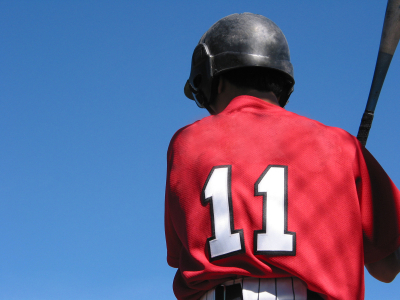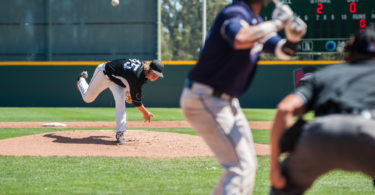We’re going to explain the box contact point in this series called “Hit the Cages.” All of these articles are going to talk about advanced hitting ideas and techniques that you’ll be exposed to in college. We’re going to talk mainly about mechanics and drills. Keep in mind, everybody’s swing is different. Some of these things will work for you. Some might not. Give it a shot! It might feel weird at first, but don’t give up on it right away. I’ll add a lot of videos of pros to demonstrate what I’m talking about, and to show you that these things actually work!
Just like the name suggests, all of these skills are things that you’re going to have to practice in the cages and in BP for a while before you can apply them in a game. Your swing is all muscle memory, and until you practice something for literally hundreds, if not thousands, of swings, you aren’t going to be able to bring it to a game. Give it the time it deserves, and get to work.
Contact at the Box
Hitters tend to focus on a million different parts of their swings that result in getting to a good box contact point. Not that many hitters focus on the contact point itself. By contact point, I mean literally the position your body, and your bat, are in when you make contact with the ball. Your stride, load, and backside can all be perfect, but if your contact point doesn’t put you in a position to hit the ball hard, none of the rest of the mechanics matter.
Stop reading for a second and get on your feet. Stride and load. Then get to your contact point, and freeze. Look at the position of your arms. Are they straight? Bent? Is your body behind your arms, or are your arms about even with the center of your chest?
Every hitter is going to get to contact differently. But at contact, you have to get yourself in a position with your body behind the baseball so that you can follow through and put a charge into the ball. A lot of hitters will reach that box contact point with their top arm straight, and their bottom arm slightly bent. But when you follow through from that position, you really don’t have much force behind the ball. Your follow through is limited to hand strength, and a slight push with your bottom arm.
Examples
As examples, let’s think about Buster Posey and Mike Trout. These hitters are not only two of the most exciting hitters in the game, but they’re also two of the most fundamentally sound. Both swing with arms bent, making a box, out in front of their bodies. By hitting with a box contact point, you can get more extension and force behind the ball by making contact and then pushing through with both arms. Instead of having only your hand strength to hit the ball, you have push with both arms, plus follow-through using your hands.
The best way to practice it is by using the most basic drills. Start on a tee. Set up the tee so that the ball is in the perfect spot for your box contact point. Then think about your contact point, and your extension after contact, as you take your swings.
Once you feel comfortable off the tee, move up to front toss, and then BP. Don’t try and implement this in a game too fast. Changing your contact point means you’re literally changing where you hit the ball, so your timing will be different. Understand that.
It might help to have someone take a video of you as you practice. Work on your contact point, and work on putting all your power behind the ball. Good luck. Now, hit the cages!







